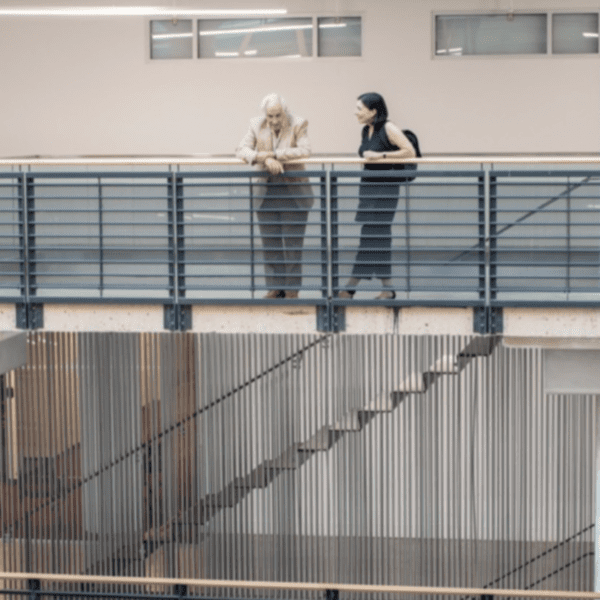
Boston architect and philanthropist Simeon Bruner has spent much of his professional life studying how the designs of urban buildings “manifest” themselves to make their surrounding communities better.
He’s never seen anything like Crosstown Concourse.
“I would say this building is unique in terms of public access and permeability and the multitude of different uses that come together without restriction,” Bruner said while touring the Concourse with The Daily Memphian late Friday afternoon.
That means anybody can enter and exit Crosstown Concourse freely, without having to pass through some checkpoint. Anybody can enter at a lot of different places throughout the building. And once inside, the place hums with a wide array of users and activities.
Bruner had a $50,000 check in his coat pocket.
He would soon hand over the cash prize to the development leaders of Crosstown Concourse during a ceremony in the Central Atrium. The building was the Gold Medal recipient for the 2019 Rudy Bruner Award for Urban Excellence.
Simeon Bruner founded the biennial award 33 years ago, naming it after his father, who had created the Bruner Foundation in 1963 with his wife, Martha. The foundation spends its money to address such social issues as health care, education and the built environment.
Which helps explain why the Bruner Foundation is not merely honoring the design of the $210 million renovation completed in 2017.
Crosstown Concourse has won top national awards from other organizations for its architectural design, for the historic preservation of the former Sears & Roebuck distribution center, and for the urban planning.
The Rudy Bruner Award focuses more on how a building or park or anything built continues to transform its community for the better.
A national panel of urban design experts chose Crosstown Concourse to receive the top prize this year. Unlike with so many other awards, the Bruner judges did not just huddle for a day or so in a room looking at photos and reading submissions.
The Rudy Bruner Award process involved several people, including Simeon Bruner and Anne-Marie Lubenau, award director and an architect, staying in Concourse apartments for three nights in March to fully experience the building.
“Consistently, there was activity,” Lubenau recalled of the three days.
She described going downstairs to the building’s Church Health YMCA to exercise early one morning and intersecting with health care workers starting and ending shifts, with business people coming to work, and with a “wave” of Crosstown High students entering the building.
“What’s fascinating, I think a lot of projects have that ambition or aspiration,” she said of the human energy that courses through Crosstown Concourse. “But here, it is happening.”
Added Bruner, “They pulled it off.”
During Friday’s short tour, Bruner and Lubenau ascended to the seventh-floor railing to look over the vast Central Atrium. They pointed out the high school and college students studying on the sofas and chairs that are arranged in the wide corridors that ring the atrium, the business people working at their laptops, children using the library built into the edge of the stairs, and people at the bottom drinking coffee and eating ice-cream.
“How many times do you see a public high school be a part” of such a development, Lubenau said. “Particularly in an era when you see growing concern about the economic stratification of our cities and communities.”
The Crosstown Concourse developers were intentional about creating an urban, vertical village and creating “a place that is for everyone,” she said.
A big, indoor public space that is air-conditioned like Crosstown Concourse is important, too, Bruner said, noting the heat outside. “This is a huge, year-round public space that you probably haven’t got a lot of in Memphis. Your parks are not as usable” in the heat.
The Rudy Bruner Award does not award the architects, the developers or the city, Bruner said. The honor awards “the place for being an exciting place.
“… It’s about making the award known and setting precedence so others can learn from it,” he said.
Crosstown Concourse probably won the Gold Medal “because it was so improbable and the scale was so big and the obstacles were so impossible,” Bruner said.
“And they did it anyway. And they did it with panache.”